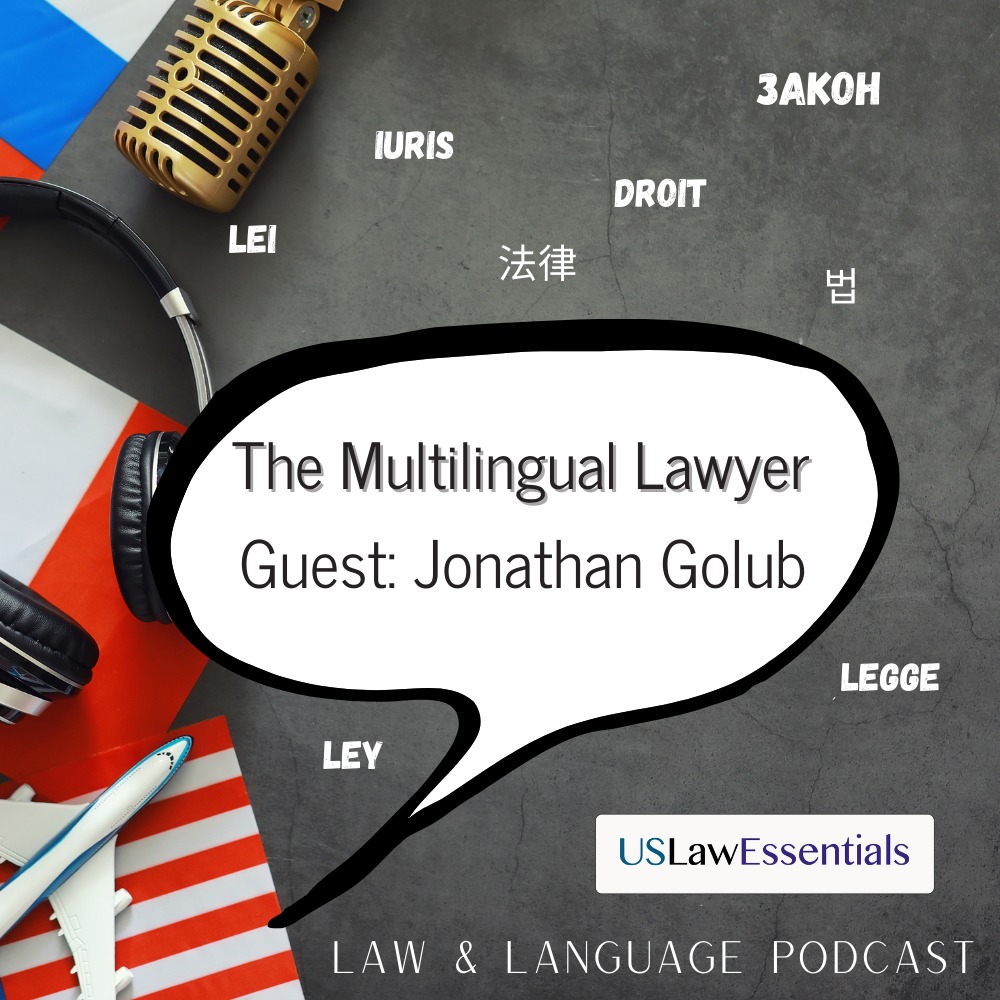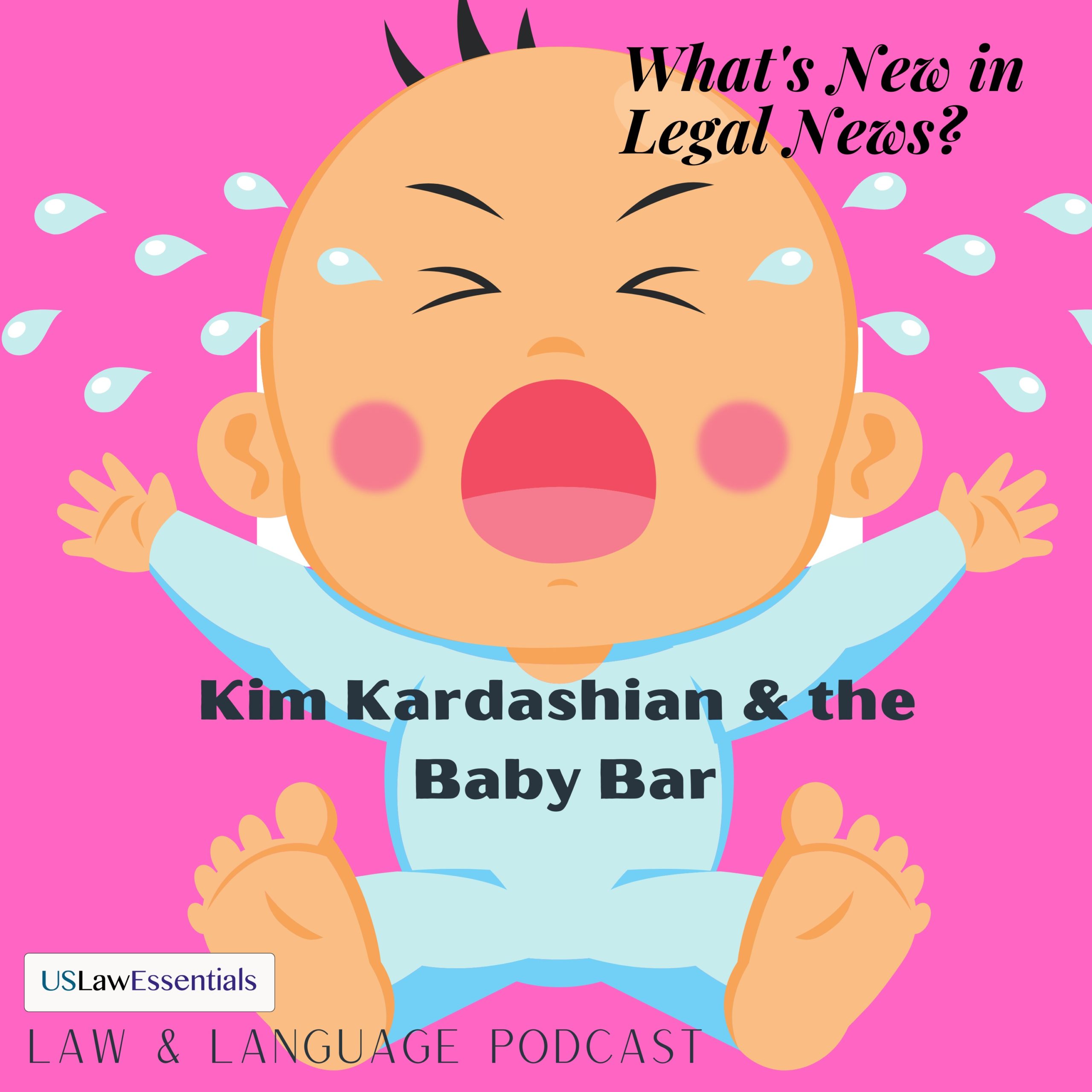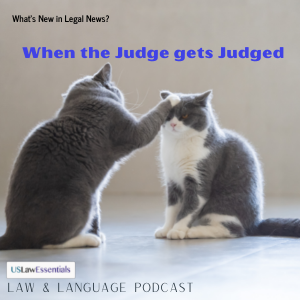Episode Transcript
Speaker 0 00:00:00 Welcome to the U S law essentials law and language podcast. The legal English podcast for non-native English speakers. That helps you improve your English, listening, improve your legal English vocabulary and build your knowledge of American legal.
Speaker 1 00:00:16 Yay. Yay. Yay.
Speaker 2 00:00:31 And welcome to the U S law Central's law and language podcast. I'm Steven Horowitz. I'm Dan Olsen and today's episode is part of our what's new in the legal news series, where one of us picks a legal news event to talk about today. It's Dan's turn. So Dan what'd you pick for us today?
Speaker 0 00:00:52 Okay. I have a recent Supreme court decision called Edwards V Vinoy. You got it? Yeah.
Speaker 2 00:01:03 Are you sure it's not van Noy?
Speaker 0 00:01:06 Um, no, I'm not the reason why I'm not sure is if you read the caption, everything in us case captions are in all capitals. So I know it's V a N N O Y, but I'm not sure if the first letter is capitalized and everything else after that is a lower case, or if it's different and I haven't checked.
Speaker 2 00:01:32 Oh, I had a, uh, my on my favorite football team, the Detroit lions, um, there used to be a player named Kyle van Noy and on his uniform, it was a big, it was a capital V and then the second end was also capitalized. So van Noy like to wear it. So I wonder if this one's van Noy, do you think that's going to affect the outcome of the case?
Speaker 0 00:01:54 It didn't. It didn't. Um, as far as I know. Okay, so Steve, I want you to use your imagination for
Speaker 2 00:02:04 A second. Okay? Okay. I can do that.
Speaker 0 00:02:07 Good. All right. Now imagine that you are in prison. Okay. All right. Not with me, but there's somebody else in a prison cell right next to you. Okay.
Speaker 2 00:02:24 So far so good. Yeah. I'm in prison. There's somebody next to me in the next cell.
Speaker 0 00:02:29 Okay. Now you've both, you've both been convicted of crimes and you were both convicted by juries by attend to, to vote. So it wasn't unanimous. 10 people said you were guilty. Two people said you were not guilty, but in your state, that was enough. And you got convicted so far. So good.
Speaker 2 00:02:50 Yeah. So I just happen to live in a state where it, the law is different and it doesn't have to be unanimous. It doesn't
Speaker 0 00:02:57 Have to be 12 to zero. Right. You know, and this is true. There were a couple states like that in the United States. So
Speaker 2 00:03:05 Say it again. Oh, I saw the movie 12 angry men. And I remember they're all pressuring that one guy to change his <inaudible> to vote with them because they need a unanimous decision. So I thought that's what it is throughout the United States.
Speaker 0 00:03:21 It's not. So for example, in this movie, the entire movie could have been very short. Cause it could have been 11 angry men, one disappointed man, and the guy still would have been guilty, but
Speaker 2 00:03:33 Yeah, that would not have that, that movie would not have been as, as entertaining. It
Speaker 0 00:03:38 Would have been a terrible movie. So, so you're in this state, you don't need a unanimous jury verdict, right? You just need 10 to two so far, so good versus not so good. Now the gentleman next to you, same situation. He was also convicted 10 to two. Got it. Okay. All right. One day he wakes up and he says, Ooh, I have to get my conviction overturned because of a recent Supreme court decision Ramos V Louisiana. And he says he is going to get out of prison because his conviction has to be overturned because that jury verdict was not unanimous so far. So good.
Speaker 2 00:04:32 Okay. Um, I think this is good news for me in my prison cell, but keep going.
Speaker 0 00:04:38 So you're celebrating and you're saying, oh good. This must be good news for me too. Right?
Speaker 2 00:04:43 Yeah.
Speaker 0 00:04:45 But then Edwards, even annoy comes along and your friend conviction was overturned yours. Wasn't how do you like that?
Speaker 2 00:04:57 Wait, wait. His conviction was overturned. And then after that, the Kyle, the Kyle van Noy that's the football player, the Edwards versus Benoit case was decided. And now suddenly I can't get the same treatment as my next door neighbor.
Speaker 0 00:05:16 Exactly. That's exactly right.
Speaker 2 00:05:19 So what, what happened in this case?
Speaker 0 00:05:21 Okay. So go back to 2020, which is only a year ago. So in 2020, only one year before the Edwards we've annoyed decision, the Supreme court decided that jury verdicts in criminal cases must be unanimous. So if it's a serious crime, like, you know, murder or something like that, it has to be a 12 to zero unanimous jury verdict tend to two verdicts are unconstitutional and those convictions have to be overturned. That's why your friend was celebrating. Right? Yeah. And that's why you would celebrate, right? Yeah. But then Edward's view of annoyed came along and said, but wait, wait, wait, that rule does not apply retroactively to people's whose cases are already over. So if you have a pending appeal, so you've been convicted in a trial court and you have a pending appeal to a state appellate court, Ramos V. Louisiana helps you. Your conviction has to be overturned. And that's why your friend was happy, but your situation was different. You already went through all your appeals, you finish all your court appeals. Yeah.
Speaker 2 00:06:44 Yeah. So just because my neighbor had a pending appeal, meaning he had an appeal that was in process or the process was not yet complete. And the court hadn't made a decision, but I've already done that. And I don't have any more appeals left. I don't get the benefit of, of the Ramos case. Right?
Speaker 0 00:07:09 So Edward's even annoy says, Ramos does not apply retroactively to people who have already exhausted their state court appeals process.
Speaker 2 00:07:20 Well, this is, this is kind of interesting because it sounds like the Ramos case, the court was saying, we want to, we want to help people who had a situation where it wasn't unanimous. And then the court a year later says, well, but we don't really want to help you
Speaker 0 00:07:41 Right now. Obviously the justices wouldn't put it in those, in those terms, the terms they would put it in. And we're both lawyers. I guess we have to put this in sort of legal terms would be that when there is a procedural change, based on this Supreme court decision, it doesn't apply retroactively and a unanimous jury verdict. That's considered a procedural change because it's a change in the process of how you get convicted. It's not a change in the actual criminal law. It's a change in the process as to how you're found guilty.
Speaker 2 00:08:26 Wow. But that procedural aspect feels very substantive to me sitting in my jail. So doesn't
Speaker 0 00:08:34 It, doesn't it. And that's, that's part of what the descent was saying because the, the rule is even that procedural change, if it's considered a watershed change, like a huge major procedural change. Yeah. And those circumstances, it can apply retroactively. The problem that's never happened. And the Supreme court has never said, oh, we're going to apply this kind of procedural change retroactively. So the majority on the Supreme court said, yeah, Ramos V Louisiana, that's a procedural change. Now all jury verdicts have to be unanimous. But if you've already gone through your appellate process in state court, a federal is not going to help you. So that's, that's your bad news.
Speaker 2 00:09:23 Wow. It feels like the Supreme court's view of the law is even if there were some bad decisions made in the past, we don't want to undo things. We don't want to undo everything. We want to let everything kind of stay the way it is just because it's easier that way.
Speaker 0 00:09:41 Well, I don't know. I mean that, I think what you're saying is, is a fair criticism actually. And I think that's consistent with what the descents criticism was just on the, you know, you, you, you hand out, you know, with one hand, with one hand, you hand out this hope, right? And this person in the prison cell right next to you, is able to rely on this decision and will actually get his conviction overturned. And here you are right next to him and it's the criticism would be well. Now with the other hand, the Supreme court just, just took away your hope.
Speaker 2 00:10:20 Wait, there's a descent. Absolutely.
Speaker 0 00:10:23 The same justices who were quite supportive of the Ramos V Louisiana decision are dissenting vehemently in, in this decision and right. Any chance
Speaker 2 00:10:38 By any chance, were there three justices voting to the cent?
Speaker 0 00:10:43 How, how are you guessing that there must be three justices? Descending is this, is this some sort of psychic power that you have
Speaker 2 00:10:51 Not a psychic power. It's just knowing that the current makeup of the Supreme court is six very conservative justices and three more, uh, progressive or liberal justices.
Speaker 0 00:11:05 Yeah. And I think that's, I think that's fair. So there was, there was in fact, um, three justices dissenting and you act, you accurately identified, um, that there are, they are traditionally considered to be more, uh, progressive or liberal than, than the other justices. And I think you could say they give a full-throated response. They give a van and response in, in the descent, which is written by, uh, justice, justice Kagan.
Speaker 2 00:11:38 So, so Dan, it seems like they're making this distinction between procedural and substantive, but then they also talk about, you had mentioned that there's procedural and you can do something about it and procedural and you can't do something about it, right? Yeah. Yeah. It sounds like you generally can't, but what's the, they must have some rationale or some sort of factors that you have to consider to, to determine that something meets one, one, you know, that goes one way or the other.
Speaker 0 00:12:13 Right. And that that's, that's an important point. So you always have to look at, okay, what are the, what are the factors or under what circumstances does it apply retroactively? And the language that this court cites it's from a prior Supreme court case that said the water set, the watershed exception is extremely narrow and applies only when, among other things, the new rule alters our understanding of the bedrock procedural elements, essential to the fairness of a proceeding.
Speaker 2 00:12:48 So it has to really shake the foundations. The bedrock bedrock is like the rock under the earth. That's very thick and doesn't move. So if that gets shaken, then we can think about procedure.
Speaker 0 00:13:05 Right? Right. So if that procedural element is so critical, then, then it can be considered a watershed event, a watershed event because somehow the underlying trial would be, it would have been unfair. And according to majority, this just doesn't qualify.
Speaker 2 00:13:25 Yeah. You know, this is this to me from a, from a language perspective. I see another example of a word, a sort of infrequently used word that, that the court infuses with, meaning that the court sort of puts a lot of meaning into it in this case, it's the word bedrock, a bedrock, uh, what did they say at bedrock bedrock principle,
Speaker 0 00:13:50 Right. It's the bedrock procedural elements essential to the fairness of a proceeding.
Speaker 2 00:13:57 Yeah. And bedrock is one of those words that, you know, you don't, people don't just study that it's not something that people use in conversation all the time. Um, it's not a particularly complicated or abstract word. Um, and yet courts, especially I think in constitutional law cases like to use these words, they take these sort of, you know, high-minded words and give them a metaphorical meaning. Um, you know, in the, in, in Jones vs Mississippi, we talked about incorrigible and encourage ability, this word that's infrequently used, but that, that a lot of meaning gets, gets sort of, um, inserted into. Um, that's
Speaker 0 00:14:43 A good point. And so here, some of these words like watershed and bedrock are words that suggest something so momentous, and if it doesn't qualify under those standards, then it just doesn't get that retroactive application.
Speaker 2 00:15:04 Yeah. And th and they're not words like bedrock and watershed and incorrigible are not necessarily legal English. They don't feel like legal English. And yet they're a big part of legal English.
Speaker 0 00:15:16 I think that's a good point where some of these really, really key words can make their way into legal English to have some sort of colorful impact. So I was thinking that if you had a contract dispute and you wanted to allege in court that your adversary breached the contract in such a material way, you might want to say that the breach has undercut the very bedrock purpose of the contract or something like that.
Speaker 2 00:15:47 Yeah. Yeah, definitely. I think that's a really good example. So as we go forward with these podcasts and look at different cases and other other news events, I think we'll keep an eye out for these kinds of, of, of, uh, infrequently used words that, that the law likes to likes to hang a lot of hats on or put a lot of weight into good point. Good point.
Speaker 0 00:16:09 All right. Well, I enjoy talking about this, this case with
Speaker 2 00:16:12 You. Yeah. Thanks, Dan. That was a really great summary and I, and I learned a lot from it as well. Can I, can I get out of my prison cell now?
Speaker 0 00:16:19 Yeah. But first you have to remind everyone that they should subscribe to our podcast and get on our mailing list so we can keep them updated.
Speaker 2 00:16:26 I think he just did that. Okay. Well you're out of prison then. Yes. Okay. Good lawyer. Thanks.
Speaker 0 00:16:32 No worries. All right. Thanks very much.
Speaker 2 00:16:35 Okay. Thanks Dan. Talk soon. Bye now.


